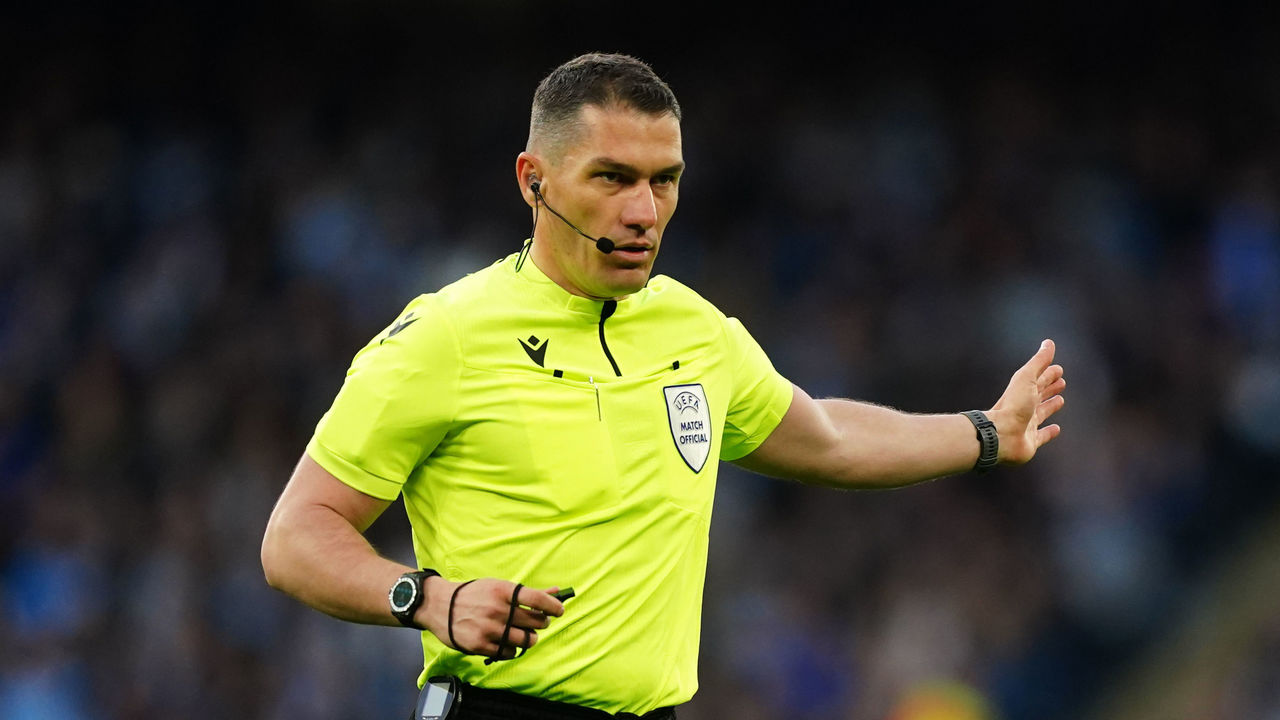The Champions League semifinals kicked off with an absolute classic, as Manchester City defeated Real Madrid 4-3 in Tuesday’s first leg at the Etihad. Below, we dissect the biggest talking points from a truly incredible match.
Real Madrid embrace the chaos
Real Madrid conceded twice in the first 11 minutes of Tuesday’s Champions League semifinal first leg at Manchester City and capitulated again eight minutes after the interval. They allowed the first goal in three of the four knockout matches that preceded the topsy-turvy contest at the Etihad Stadium, and yet, they progressed each time.
Madrid responded on Tuesday as well. Karim Benzema produced an unbelievable touch to make it 2-1, Vinicius Junior ran unabated to make it 3-2, and Benzema’s beautifully executed Panenka made it 4-3. Madrid didn’t play well at all – City could’ve scored another three or four goals – but they again found success amid chaos. Two pieces of individual brilliance kept them in the game, and a penalty kick kept them in the tie, but it felt like Madrid enjoyed the contest more than City did. Every time City scored, Madrid had an answer.

In previous matches, Madrid needed a substitution or two to spring back to life. But manager Carlo Ancelotti didn’t do much to influence Tuesday’s encounter. He just allowed Madrid’s best players to do their thing. Benzema hurried to take a corner kick, Toni Kroos and Dani Carvajal sent in dangerous free-kicks and crosses, and Luka Modric surged into the penalty area. They wanted to find the quickest way into the final 18 yards, and they did. It was all instinct, a phenomenon of muscle memory.
“I have a squad who knows these types of games very well, knows what has happened, and knows what can happen,” Ancelotti said earlier this month, according to The Athletic’s Dermot Corrigan.
Los Blancos are still fighting in this competition because their players have such a sense of occasion, such opportunistic qualities, and such a pedigree in the Champions League that no game ever seems lost. Just imagine how good they’d be if they didn’t need to fight back in the first place.
City tend to panic in Champions League
Manchester City’s short history in the competition reads like a drama. It’s unusual: City rarely break stride in the Premier League, showing few nerves, but as soon as the Champions League anthem rings out, they take on a different personality. It’s true that Pep Guardiola, one of the greatest managers of all time, routinely overthinks European matches, but that’s not what happened on Tuesday. The pressure of expectation is the culprit here, not any tactical oversight.
Benzema said it best afterward, per Mirror Football’s Colin Millar: “It’s confidence, nothing more. It’s all mental.”
Add the whacky 4-3 win over Madrid to the 6-6 defeat on away goals to Monaco in 2017, the 4-4 defeat on away goals to Tottenham Hotspur in 2019, and the 3-1 shocker at the hands of Lyon in 2020. City have been all over the place in this competition, and that’s why they’ve failed thus far to win it.

In reality, City created enough chances to ice the semifinal tie on Tuesday. They could’ve had a multi-goal cushion heading into next week’s second leg at the Santiago Bernabeu, which, given Madrid’s seeming immortality, could’ve come in handy. Instead, Oleksandr Zinchenko narrowly missed wide, Riyad Mahrez hit the post, and Aymeric Laporte shot straight at Thibaut Courtois from six yards away.
Now the Premier League champions need to approach the second leg with caution. They have it within themselves to play a more reserved game. They’ve used possession as a form of defense against Liverpool – and came away with decent results. It’s time for City to be pragmatic. They’re ahead on aggregate, and all they have to do is keep it that way.
Fernandinho giveth and taketh away
Real Madrid’s plan of attack was painfully obvious on Tuesday.
With Guardiola facing a full-back shortage through a combination of injury (Kyle Walker) and suspension (Joao Cancelo), the Spanish strategist was forced to deputize John Stones at right-back, despite admitting before the match that the Englishman, a central defender by trade, was also a “doubt” due to an undisclosed muscle issue.
Vinicius sought to take full advantage down his left wing; Madrid made a concerted effort to attack Stones before his injury flared up and forced him to leave the pitch in the 36th minute. Fernandinho, the 36-year-old midfielder, took his place. There was no classic Guardiola tinkering this time. The veteran slotted right into Stones’ vacated spot. What choice did Pep have, really?
The decision seemed inspired when Fernandinho left Vinicius sliding on his backside with his first touch of the match and even better when, early in the second half, he lofted a sumptuous cross onto Phil Foden’s head to help City grab what was then a commanding 3-1 advantage.
He then proceeded to undo his good work almost immediately, falling – quite horribly – for a wicked dummy near the touchline. Vinicius, who in his sleep could beat his compatriot in a sprint, turned on a dime and raced roughly 60 yards after the nutmeg, eventually slotting home a sensational goal.
Vinicius Jr. ended Fernandinho and he didn’t even touch the ball. ?? pic.twitter.com/k7GH25ve9L
— CBS Sports Golazo ?? (@CBSSportsGolazo) April 26, 2022
He’s not the first player to get posterized by the electrifying young winger, but his midfield instincts came back to bite him in this instance. In the center of the pitch, often a congested area, if you try to jump a pass and miss, there should be someone backing you up. You have more liberty to take those risks. Isolated one-on-one out wide, though, there’s nowhere to hide. Laporte didn’t cover himself in glory on the play, either, oddly refusing to come across and engage with Vinicius as he approached the penalty area. But it was Fernandinho’s overzealousness that created the opportunity.
Tuesday’s madcap contest brought back memories of Manchester City’s similarly frenetic 5-3 win over Monaco in this same competition back in 2017. Playing at full-back that night? Fernandinho.
Some praise for the referee
Let’s face it: being a referee at this elite level simply cannot be fun. You’re constantly maligned. Half of the people watching are upset with every decision you make, and the only time you garner significant attention is when you’ve made a mess of things. Nobody remembers a flawless officiating performance, but everyone recalls the terrible ones.
We’re flipping the script this time, though. Istvan Kovacs deserves plenty of praise for the way he handled the buildup to Manchester City’s fourth goal of the match. Bernardo Silva’s quick-witted rocket was the result of a fantastic advantage played by Kovacs, who didn’t rush to blow his whistle when Zinchenko was hacked down by Kroos on the edge of the area.

Instead, with Silva picking up the loose ball, Kovacs allowed play to continue. Carvajal stopped for a moment, expecting the whistle to sound. That split-second gave Silva the space he needed to uncork a shot that flew past a surprised Courtois. At the highest level of the sport, the tiniest hesitation makes all the difference.
That goal stood as the one to ultimately separate the two teams, and Kovacs’ part in it was paramount. Well done, referee.


